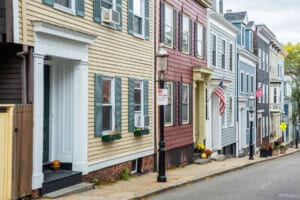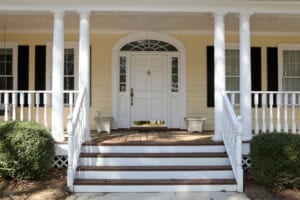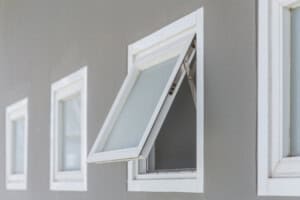Windows and doors add a lot of personality to a home, but style and color aren’t the only things to take into account. It’s also essential to factor in thermal insulation, energy efficiency and local weather conditions to ensure you’re helping homeowners choose the right materials.
Read on to learn more about trends in windows and exterior doors in regions across the United States.

Northeast
Classic home styles like Colonials and Cape Cods — commonly found in the northeastern part of the country —typically feature double-hung windows, which offer enhanced safety for kids and pets, easy maintenance and a wide variety of customization options. Because temperatures fluctuate so much in this area, homeowners need insulated windows that keep heat or cool air inside. Wood-clad windows with at least two layers of glass are a popular option as they help keep home temperatures constant while staying true to the historical style of the region.
When it comes to doors, the insulation offered by fiberglass and solid wood doors helps keep homes warm in the winter — making them excellent options for energy efficiency. Traditional styles like raised panel doors complement the historical look of New England homes. This style also pairs well with muted blue tones as it strikes a balance between classic and contemporary.
Southeast
The hot summers and mild winters of the Southeast mean that homeowners will want to block out as much solar heat as possible to keep energy costs to a minimum. Low-E glass is an excellent option for this region as it blocks heat from the sun while still allowing light into homes. For even more cooling benefits, double-hung windows are an optimal choice since they allow homeowners to air out their interior and welcome the occasional cooling breeze. For a more open, modern feel, you may want to try picture windows. Not only do they have a sleek look, but they also provide an additional level of energy efficiency since they are sealed.
Fiberglass doors are incredibly durable and offer energy-efficient foam that keeps Southern homes cool. Meanwhile, French doors have become increasingly popular in the Southeast, offering elegance and increased natural light. This style also suits homeowners who appreciate a more seamless indoor-outdoor living experience.

Midwest
With wide fluctuations in temperature and the threat of tornadoes, Midwest homes need to be ready for anything. Casement windows have proven to be durable in windy weather, and they form a complete seal that makes them ideal for insulating homes in hot or cold conditions. Double-pane or triple-pane windows also help insulate homes further. Many homeowners choose double-hung windows for ease of use or opt for prairie windows with long horizontal lines for a classic Midwest style.
In terms of doors, durable iron is great for the extreme weather in this region and tends to be more affordable, keeping door costs low. The farmhouse style of doors with simple finishes and neutral colors is also a trendy look in the Midwest.
Southwest
Homeowners in the sunny Southwest will want to cut down on the solar heat entering their homes to save on energy costs. Ideally, windows will have a solar heat gain coefficient (SHGC), which is the measure of heat transmitted from the sun through a window, below 0.3. To achieve this, avoid single-pane windows that provide little insulation to the home and opt instead for the more energy-efficient double-pane window.
In this drier climate, homeowners can enjoy the natural beauty of wood window frames, as the region’s weather doesn’t subject them to the damage of excess moisture. There is also a growing preference for metal frames such as aluminum in cities due to their contemporary look, but it is crucial that they have a thermal break. On the other hand, anyone looking for more customizable and affordable looks can find the right fit in a tried-and-true option — vinyl frames.
A standard-sized door in hardwood and vinyl works well in the dry heat. Doors are the perfect opportunity for a splash of color to give homes some added curb appeal. Homeowners can draw inspiration from the desert landscape and incorporate warm terra cotta, turquoise or sage hues. Adding iron accents also creates a charming rustic look commonly seen in the Southwest.

Pacific Northwest
Homes in the mild, moist climate of the Pacific Northwest are best outfitted with large windows that offer insulation and protection, such as bay or bow windows. Awning windows allow fresh air in the house even during a rainstorm, and materials like vinyl and fiberglass hold up well. There is an increasing shift toward aluminum-clad windows due to the customizable color variations and the modern aesthetic they offer.
Windows with a higher SHGC are ideal for the long winters and short summers of this region. Constant humidity makes weather-resistant fiberglass doors a great option. Bold pops of colors like teal, mustard and red bring a mid-century modern look that is commonly found in the Pacific Northwest.
Coastal Homes
Coastal homes must withstand a range of natural elements, requiring resilience against heat, moisture, strong winds, saltwater exposure, tropical storms and hurricanes. Both vinyl and aluminum window products are popular in the region due to their affordability and the added benefit of offering hurricane impact-rated options.
For those looking to maximize their coastal views, bay windows are a fantastic option as they offer abundant natural light and stunning vistas. Casement windows provide a tight seal, which is essential for protection from wind and water. Durable iron or fiberglass doors are a necessity in this region. The popular nautical style of coastal homes includes blue hues and details like rope, brass hardware and shiplap accents.
ABC Supply has a variety of options for windows and doors that are suited for any climate or home style. Visit your local ABC Supply location to check out the materials available. You can also learn about other exterior pieces for your region like siding and roofing.